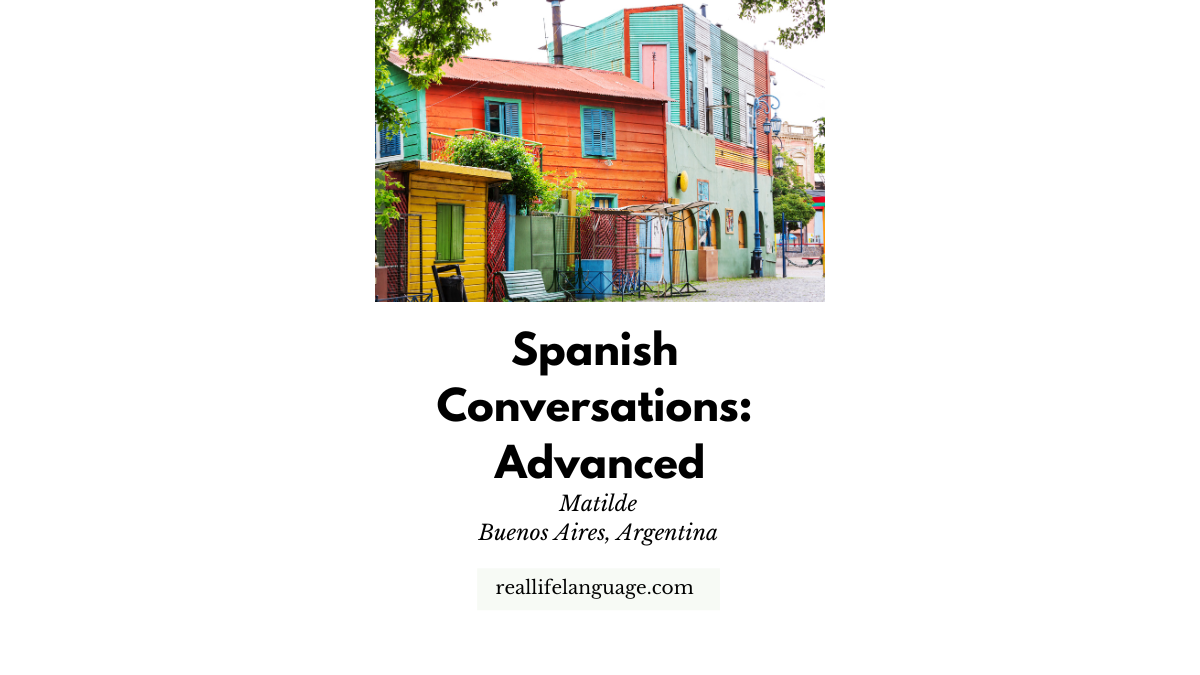
This article accompanies a conversation with a guest from Buenos Aires and is designed to help learners who want to learn advanced Spanish. The speaker describes daily life, gender roles, housing, education, parties, food and the pandemic in Argentina. For learners aiming to learn advanced Spanish, this piece collects key cultural insights and useful vocabulary and phrases that appear naturally in the conversation.
Overview: who speaks and why it matters
The speaker grew up outside the city of Buenos Aires in Villa Ballester, a smaller town within the San Martín district. She spent her childhood and adolescence there, later moving to the capital. Her perspective is valuable because it contrasts life in a provincial town with life in Buenos Aires, which affects topics such as gender roles, housing and daily routines. Learners who want to learn advanced Spanish will benefit from understanding these regional and cultural nuances.
Women and gender roles
The speaker notes that Argentina’s larger cities are more progressive, but smaller towns and provinces remain conservative and sexist in daily interactions. Examples given include restaurant staff or hotel managers addressing men instead of women, even when the woman is the one speaking or ordering. However, change is visible: feminist campaigns and posters, as well as strikes, appear even in smaller towns, showing generational shifts.
“Sometimes we were at a ranch or a hotel… the manager would answer and he would look at my boyfriend and not at me.”
The economy and daily costs
The economic situation is described as difficult: inflation and the impact of global events have raised prices, and supplies such as gas can be affected. The speaker explains that housing and rent in Buenos Aires are especially expensive, and the country is slowly trying to correct previous policies but progress is gradual.
Housing in Buenos Aires
Housing in the capital is compact: many buildings are constructed with one or two rooms (estudio or departamento de dos ambientes). Newer developments prioritize more units over space, so multiple bathrooms are rare. Developers often insert a bathroom into the bedroom (baño en suite) to economize space, which means guests must enter private areas to use the toilet. Outside the city, houses are more common and usually more affordable.
“In Buenos Aires it is very very expensive to live… they build one- or two-room apartments and they are getting smaller.”
Education
Argentina offers both public and private education. The speaker experienced entirely public schooling, including university, which can be free. Prominent public universities (for example, the Universidad de Buenos Aires) enjoy strong reputations. Private schools are often bilingual, offering subjects in English and Spanish, and may provide longer school hours. Public school schedules are typically morning-focused (e.g., 7:30–11:30 or 12:30).
Parties, leisure and social life
Argentines like late social schedules. Pre-parties (pre-partes) at home start late; punctuality is flexible—invited guests often arrive an hour after the stated time. The nightlife continues until the early morning, and home gatherings include pizza, drinks and games. Leisure also involves long meals (lunches that can stretch from noon until four), cafés, movies, music and sports.
Food and mate culture
Typical foods include empanadas and a distinctive, very cheesy pizza. Mate is central to daily life: an infusion of yerba mate drunk through a metal straw (bombilla). Mate is shared socially and appears in schools, offices and parks. The speaker notes that variations exist—sweetened mate is sometimes criticized by purists—and that Argentines abroad often ask relatives to bring specific yerba brands back from Argentina.
“People can’t be without drinking mates… even teachers bring mate to class.”
Current events and the pandemic
The guest touches on global issues such as war and shortages: international conflict has increased prices and affected fuel availability. Regarding the COVID-19 pandemic, Argentina had strict quarantine measures that lasted around a year and a half. While those measures reduced fatalities in some cases, they also caused economic hardship and job losses. Remote work increased and some changes remain.
Family and personal notes
The speaker’s immediate family lives mostly near Villa Ballester; siblings have moved to different cities and countries. She describes close ties with parents, nieces and extended family in coastal cities like Mar del Plata, and a 98-year-old grandmother who remained healthy through the pandemic.
Useful Spanish vocabulary and phrases for learners
Below are practical words and expressions from the conversation, shown in Spanish with English translations and usage tips for learners who want to learn advanced Spanish.
- Villa Ballester – a district outside Buenos Aires (proper noun).
- dos ambientes / un ambiente – “two-room apartment / studio”. Use when discussing housing.
- baño en suite – “en-suite bathroom”. Note how developers use this term to market small apartments.
- yerba mate – the herb used to prepare mate. Example phrase: “¿Querés mate?” (Do you want mate?).
- bombilla – the metal straw used to drink mate.
- pre-party / previa – social gathering before going to a nightclub. Example: “Nos juntamos en la previa a las diez.”
- estar acostumbrado(a) – “to be used to”. Useful: “Estoy acostumbrada a tomar mate” (I am used to drinking mate).
- congelamiento / inflación – economic terms: “freeze” (in some contexts) and “inflation”. Practice discussing the economy with: “La inflación subió” (Inflation went up).
- cuarentena – “quarantine”. Example: “La cuarentena fue estricta” (The quarantine was strict).
How to use this material to learn advanced Spanish
To learn advanced Spanish with this content, learners should:
- Practice retelling each section in Spanish, using the vocabulary list to replace English terms.
- Record and compare pronunciation and intonation when describing cultural details (e.g., “mate”, “dos ambientes”).
- Write short essays arguing for or against policies mentioned (housing, education, quarantine) to build persuasive language skills.
- Role-play scenes: ordering pizza, asking for mate, negotiating rent—this builds conversational fluency and cultural competence.
Conclusion
This conversation paints a vivid picture of life in Buenos Aires and nearby towns—highlighting gender dynamics, tight housing, public education, lively social habits and the central role of mate. Learners who want to learn advanced Spanish can use the cultural examples and vocabulary here to deepen both language skills and cultural understanding. Practise the phrases, compare regional differences, and try role-playing the scenarios to make the language come alive.
100s of videos to learn Spanish:
https://real-life-language.kit.com/b1531a6404
Learn Advanced Spanish: A Conversation with María from Uruguay

